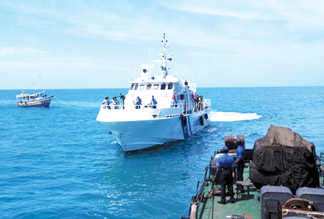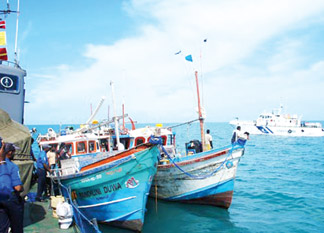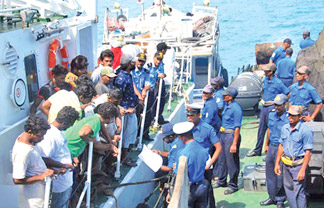Swift action to secure release of Sri Lankan fishermen
By Ranil WIJAYAPALA
The issue of Sri Lankan fishermen poaching in Indian territorial
waters and the Indian fishermen poaching in the Sri Lankan territorial
waters was one of the hot topics that has been discussed extensively
between Sri Lanka and India over the years but without seeing any
permanent solution.
  Although
the poaching in each other's territorial waters became a political issue
for the two countries at the height of the battles between the Security
Forces and the LTTE - before the final victory of the Security Forces in
May 2009, it has now become an issue that could be settled amicably
between the two. Although
the poaching in each other's territorial waters became a political issue
for the two countries at the height of the battles between the Security
Forces and the LTTE - before the final victory of the Security Forces in
May 2009, it has now become an issue that could be settled amicably
between the two.
The incidents of Tamil Nadu fishermen being harassed in the Exclusive
Economic Zone of Sri Lanka after the LTTE's defeat has stopped, Tamil
Nadu Fishermen's Federation (TFF) President R. Anbazhagan said when he
met Fisheries Minister Dr. Rajitha Senaratne in Colombo this week.
According to him, over 450 Tamil Nadu fishermen engaged in fishing
near Sri Lanka's maritime boundaries, died due to LTTE attacks over the
past few decades.
"We are not faced with that problem anymore since peace has returned
in Sri Lanka because of the President of Sri Lanka," he said.
The remarks of TFF President indicates that one of the major issues
Sri Lanka and India was faced with for years is now become a very minor
issue, following the eradication of LTTE terrorism.
Therefore, the mutual understanding between the two countries, in the
absence of the LTTE terror, has helped relevant authorities to settle
issues related to fishermen poaching in territorial waters of each other
at ground level and then take preventive measures.
As a result the Tamil Nadu Government has released all Sri Lankan
fishermen held in their custody following talks with Minister Dr.
Rajitha Senaratne last month.
According to Fisheries Ministry officials the Joint Interrogative
Committee (JIC) of the Indian Government has released 57 Sri Lankan
fishermen and 11 fishing boats in Indian custody.
Four fishing vessels 'Ranahansi 2' and 'Sathsindu' sailed from Matara
and 'Kalanaputha' from Trincomalee which had entered Indian waters, were
ferried to Kankesanthurai harbour by the Sri Lanka Navy, after they were
released from Vishakapatnam in India along with the fishermen on board.
The vessel 'Pearl Ishara' which had sailed from Dondra Head and
drifted towards Indian waters due to engine failure was also brought
along to Sri Lanka with others.
Another five fishing vessels 'Ashan Putha' from Negombo, 'Chathini'
from Matara, 'Dhanushka Putha' from Trincomalee, 'Randilini Duwa' from
Galle and 'Kapila Putha' from Trincomalee, with 26 crew members on board
also reached Talaimannar on August 18 evening after they were handed
over to the Sri Lanka Navy by the Indian Coast Guard near the
International maritime boundary line.
 According
to Ashoka Jayaweera, Acting Assistant Director of the Monitoring,
Controlling and Surveillance Division of the Fisheries Ministry, the
habit of fishermen of Mutli-day fishing boats entering Indian waters in
search of potential fishing grounds continue despite the warnings issued
to them by the Fisheries Ministry and the Sri Lanka Navy. According
to Ashoka Jayaweera, Acting Assistant Director of the Monitoring,
Controlling and Surveillance Division of the Fisheries Ministry, the
habit of fishermen of Mutli-day fishing boats entering Indian waters in
search of potential fishing grounds continue despite the warnings issued
to them by the Fisheries Ministry and the Sri Lanka Navy.
"There are fishermen from both countries entering each others
territorial waters in search of potential fishing grounds", he added.
According to him they, the fisherfolk do have the necessary
instruments in their boats to know their bearings.
"But still they take the risk of venturing a little beyond for a
better catch", he pointed out.
But their voyages in search of bigger catch, eventually end up in the
hands of the Indian Coast Guard or the Indian Navy, and then the
Fisheries Ministry, for the Sri Lankan Government, had to get involved
with the Indian authorities to get them released.
After that, the Sri Lankan High Commission in India has taken it up
with the Indian authorities to get them and the vessels released, and
finally repatriate them.
The Fisheries Ministry on receipt of information that our fishermen
have been taken to custody will initiate action through the Consular
office of the High Commission" to secure their release, he said.
The fisheries Ministry, has to bear the cost involved in getting them
released from the prisons and paying for their air tickets.
Due to the intervention of Fisheries Minister Dr. Rajitha Senaratne,
the release of fishermen has been expedited in the past few months. At
the same time, the number of vessels entering the Indian territorial
waters has also dropped due to the stance taken by Minister, Jayaweera
said.
In some instances fishermen were released even without going through
the legal process.
However, the repatriation by the Indian Government takes a longer
time. Travel documents for repatriation require a certified copy of the
release order, and no objection certificate from the Court, clearance
certificate from the CID, clearance from the foreigners registration
regional office. Due to this long process of repatriation, sometimes
fishermen have to stay in India for more than one or two months even
after they were released from the Courts", he said.
In Tamil Nadu there is a committee called Joint Interrogative
Committee (JIC), which comprises the Indian Coast Guard, Police and the
other Indian authorities. The Sri Lankan High Commission could access
the JIC for the release of our fishermen without resorting to legal
action.
Fishing vessels drifting towards their territorial waters due to
mechanical defects are required to inform the Indian authorities of
their distress beforehand.
According to P.M. Upasena, the owner of fishing vessel 'Pearl Ishara'
they faced no major hardship when they reached Vishakapatnam, after
drifting towards India as they had sent a distress message to the Indian
authorities beforehand through the Fisheries Ministry.
Fisheries Minister Dr. Rajitha Senaratne is seriously considering a
mechanism to monitor the fishing vessels and warn them when they
trespass the territorial waters of other countries.
The Minister is holding discussions with several agencies to have the
Vessel Monitoring System installed, Jayaweera added.
"If the fishermen ignore the warnings signalled by the new monitoring
system they have to look after themselves when they are caught", he
added.
Navy Spokesman Captain Athula Senerath said that the Navy also warns
the fishing vessels if they enter the territorial waters of an another
country. These vessels are sometimes well aware of their locations, but
ignore the warnings issued by the Navy personnel.
Captain Senerath said the Navy begins the repatriation process after
the fishing vessels and the fishermen are handed over to them by the
Indian Coast Guard personnel at the International Maritime Boundary
Line.
Sri Lanka Navy assisted in the repatriation of twenty six (26) Sri
Lankan fishermen, who were released from the Indian custody on August
18.
The fishermen were handed over to SLN officials by an Indian Coast
Guard vessel at the Indo-Sri Lanka International Maritime Boundary Line
(IMBL), north west of Thalaimannar. They had been brought to the
Thalaimannar Naval Base on August 18.
Earlier on August 16 Navy assisted in the repatriation of sixteen
(16) Sri Lankan fishermen, who were released from the Indian custody.
Fishermen released by the Indian Coast Guard are taken to the nearest
harbour along with their vessels. The Navy will assist them to repair
their boats if they are not in good conditions", he said.The Sri Lanka
Navy discusses issues relating to poaching with their Indian
counterparts and the Indian Coast Guard officials once in every six
months on board a vessel at the International Maritime Boundary Line of
the two countries.
Discussions are being held in Tamil Nadu to settle the issues
relating to poaching. |

